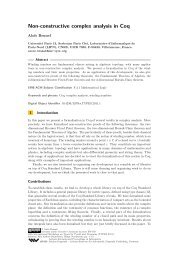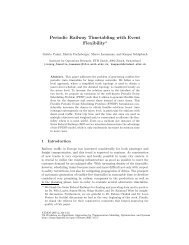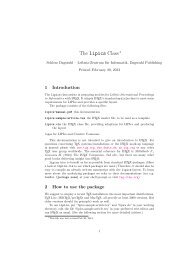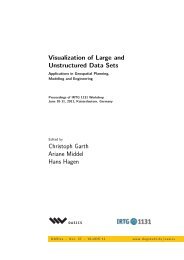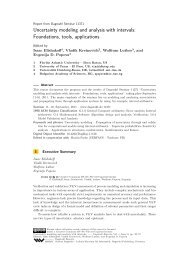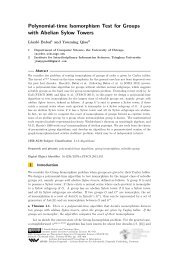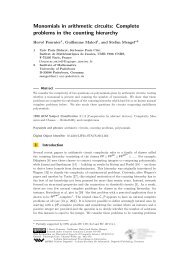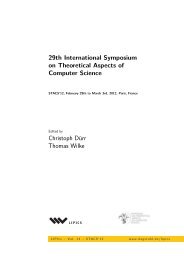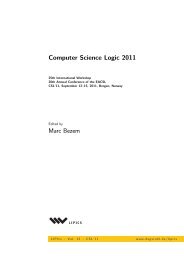Volume 1, Issue 1, January 2011 - DROPS - Schloss Dagstuhl
Volume 1, Issue 1, January 2011 - DROPS - Schloss Dagstuhl
Volume 1, Issue 1, January 2011 - DROPS - Schloss Dagstuhl
You also want an ePaper? Increase the reach of your titles
YUMPU automatically turns print PDFs into web optimized ePapers that Google loves.
Hans J. Boehm, Ursula Goltz, Holger Hermanns, and Peter Sewell 21<br />
JMM. For lockless programs, our model is more expressive than the JMM. The stratification<br />
properties required to avoid causality cycles are derived, rather than mandated in the style<br />
of the JMM.<br />
The JMM is arguably non-canonical in its treatment of the interaction of data races and<br />
locks as it fails to validate roach-motel reorderings and various peephole optimizations. Our<br />
model differs from the JMM in these cases. We develop a theory of simulation and use it to<br />
validate the legality of the above optimizations in any program context.<br />
3.30 RAO Memory Model<br />
Vijay A. Saraswat (IBM TJ Watson Research Center - Hawthorne, US)<br />
License Creative Commons BY-NC-ND 3.0 Unported license<br />
© Vijay A. Saraswat<br />
Talk describes essence of the RAO Model presented in PPoPP 2007.<br />
3.31 Understanding POWER Multiprocessors<br />
Susmit Sarkar (University of Cambridge, GB)<br />
License Creative Commons BY-NC-ND 3.0 Unported license<br />
© Susmit Sarkar<br />
IBM POWER multiprocessors have a very relaxed memory model (ARM is similar), including<br />
instances in which programmers can observe non-atomicity of stores, register shadowing, and<br />
speculative executions past branches. I will describe joint (ongoing) work with Peter Sewell,<br />
Jade Alglave, Luc Maranget, and Derek Williams on our extensive testing of Power G5, 5, 6,<br />
and 7, producing some perhaps-surprising results, and on an abstract-machine semantics<br />
that explains these results.<br />
3.32 Validity of Program Transformations (in the Java Memory Model)<br />
Jaroslav Sevcik (University of Cambridge, GB)<br />
License Creative Commons BY-NC-ND 3.0 Unported license<br />
© Jaroslav Sevcik<br />
In this talk, I will give an overview of validity of compiler transformations in the Java Memory<br />
Model, Sequential Consistency and the DRF guarantee. I will also explain several interesting<br />
examples of transformations that are problematic for the Java Memory Model. Finally, I will<br />
show that there are program transformations that are valid under SC but not under TSO or<br />
DRF.<br />
1 1 0 1 1



